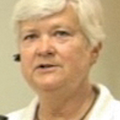BALTIMORE, MD -- The most valuable piece of equipment in the back of an ambulance won't be recalled and doesn't have an expiration date.
It's the hand of a provider.
Coverage of Firehouse Expo 2011
While there are protocols for treating patients having heart attacks, chest pains, severe illnesses, respiratory issues and trauma, providers who suddenly find themselves with parents who've lost a child often aren't sure what to do or what to say.
Yet, their actions on the family's worst day of their lives will be remembered for a lifetime.
On Thursday afternoon at Firehouse Expo, about 30 responders sat quietly while Peter A. Fiackos, a Maryland paramedic, relived the stillborn death of his son, Joseph.
"It happened 17 years ago. But, I remember everything."
He lost his son at 36 weeks when his former wife became critically ill. "They had to deliver him vaginally. A C-section would have killed her."
Fiackos praised staff at Johns Hopkins Hospital for putting them on a different floor than all the new mothers who were celebrating the births of their babies.
He told the students how he baptized his son in the delivery room holding a cup of water. "A nurse had to hold me up because my legs were shaking. I thought I was going to collapse."
Fiackos said baptizing his son was important to him.
After the death, Fiackos started telling his story to help responders understand the dynamics of what happens when a baby dies.
Just as they don't know what to expect when they get toned out for a structure fire, a wreck or heart attack, he told them never to assume how's it's going to be when they get the call for an OB-GYN.
He said emotions run the gambit. "When I was sitting in my wife's room at Hopkins, I was not an emotional wreck. I was calm, cool and collected."
Responses are unpredictable. There may be guilt, relief, anger.
"Sometimes their responses will surprise you."
He said it's important to handle the baby as just that. Wrapping it in a towel or blanket was suggested. "Never, ever put it in a red bag or aside as garbage."
As he spoke, several in the room wiped tears and shook their heads.
"Offer an open hand. Listen, really listen to what they are saying. And, always, always be honest with them."
Fiackos stressed the importance of keeping the family unit intact throughout.
"The mother and the father need to be together. Don't ever put the mother and infant in the back of the ambulance, and tell the father to follow you to the hospital. He needs to be in that ambulance. He is in no shape to get behind the wheel."
Fiackos went through statistics about stillbirths, miscarriages and SIDS, but he emphasized repeatedly the importance of making sure providers are aware of the emotional trauma that accompanies situations involving the death of a child.
He said he knows the health of the mother is first and foremost on the mind of the provider, who will carefully detail her previous medical history.
But, along with the medical treatment, the psychological needs should be addressed.
"If they want to hold the baby, let them. They need to bond. Ask if he or she has a name, and use it. And, don't put dad in the car behind you."
He said they should offer to call someone, a friend, minister or relative. They need a patient advocate, and that is you, he told them.
"Ask if they want you to take a picture. Ask if they would like a little lock of hair. If so, snip from the back of the head. These are mementos they will cherish."
It's important, he said, to be honest.
Fiackos said responders need to know what to do, and consider the emotional situation.
"It will be emotional for the crew as well," he said.
Fiackos dedicates every session to his son. "I do it in his memory, It's my way of honoring Joseph."
About the Author
Susan Nicol
News Editor
Susan Nicol is the news editor for Firehouse.com. She is a life member and active with the Brunswick Volunteer Ambulance & Rescue Company, Oxford Fire Company and Brunswick Vol. Fire Co. Susie has been an EMT in Maryland since 1976. Susie is vice-president of the Frederick County Fire/Rescue Museum. She is on the executive committee of Frederick County Volunteer Fire and Rescue Association. She also is part of the Maryland Institute for Emergency Medical Services Systems (MIEMSS) Region II EMS Council. Susie is a board member of the American Trauma Society, Maryland Division. Prior to joining the Firehouse team, she was a staff writer for The Frederick News-Post, covering fire, law enforcement, court and legislative issues.
